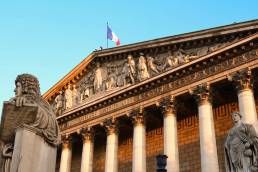Crisis – What crisis?
For decades indeed we have experienced – in Europe and elsewhere – a seemingly endless succession of such challenging, disruptive events. In only 15 years we went through the banking, finances, public debt and Euro-crises, we struggled to respond to the inflow of refugees, asylum seekers and economic migrants; we had to manage the Covid-19-pandemic; we increasingly cope with the impact of the climate change-linked disasters, and now war is back on the European continent.
Since its inception, the dynamics of a deeper European integration have always been functioning at their best whenever the urgency of a collective response unquestionably prevailed over the hurdles of antagonistic national interests.
After some hesitation to acknowledge the US-intelligence that Putin would indeed invade Ukraine, the EU-response was stronger and faster than feared, be it still incomplete and partly inefficient in the short term.
As it was the case with the disruptive events in other domains, the Russian invasion of Ukraine has brought to the front the essence of what should be decided and done to better safeguard the lives and interests of the citizens of the European Union and all humans living on the European continent. This means increasing our efforts to defend ourselves and to deter opponents from attacking our free world, strengthening the ties and cooperation within the North Atlantic Treaty Organisation, live up to our commitments in terms of contribution to the Alliance and sufficiently invest in our military capabilities, including the ones needed to protect our sovereignty and interests in the new domains of 21st century warfare. Our geographical situation also implies more than ever the responsibility to develop a stronger European military capacity in complementarity to NATO, but with specific objectives that derive from the threats, challenges and opportunities we are facing in our immediate neighbourhood.
The Europe of the European Union is after all the peninsula of the Eurasian continent. Our common territory is surrounded by threatening situations: the border with Russia and Belarus; the sometimes dubious role played by the autocratic regime in Turkey; the Middle East and its lasting antagonisms; Northern Africa with the Libyan failed state acting as a transit zone to Europe and its welfare states for the booming demography of the African continent; the Maghreb-countries full of resentment and their difficult struggle for a better future for the younger generations; last but not least the Western Balkans that at least for part of their nations are since far too long waiting in the antechamber of the EU. Adding up to this geographical reality, the European Union has to acquire a geopolitical importance that is better in accordance to its economic weight and the values it is built upon. It has to avoid being squeezed between the US and China and undergoing their duopoly. This is not contrary to the ties and links of friendship and shared values with the United States and the shared interests with other nations all over the globe.
Notwithstanding the cynical renaissance of old-fashioned warfare in Ukraine, the European security policies should have a much wider scope than the traditional military strategies and weaponry. There is – amongst others – the cyber warfare. And furthermore, the geopolitical power of the future lies more than ever in the capacity of not being forced to rely on real and potential enemies for the supply of essential resources.
Covid-19 has shown that the worldwide deployed supply chains can too easily be disrupted; this disruption causing immediate economic damage. Even more importantly, the pandemic has also shed a light on our too important dependence of external suppliers for essential medicines and health protection tools. It must be a priority for the European Union and its member states to systematically review the European and national capacities to produce these essential goods needed to safeguard the health of its citizens, whilst not undermining free global trade.
Resources, Environment and Energy
The war in Ukraine proves – if still necessary – our too important dependence of non-European supply of energy and natural resources. Earlier attempts to integrate the energy production and distribution have failed as a consequence of ill-based concepts of national sovereignty. The historic momentum of the coinciding climate change objectives with the new security imperatives should be seized by all member states and by the Union. The massive replacement of the Russian supply by other resources of fossil fuels can only be accepted for a very short period of time. The shift towards green energy should go further at a higher pace.
The mostly time and political energy consuming decision making in the European Union has recently delivered breakthroughs on important issues. The Resilience and Recovery Fund, its financing, the Green Deal, the active and constructive role of the EU in the OECD-led minimum taxation for multinationals, the worldwide standard setting General Data Protection Regulation and the social media regulation are just a few examples. After some hesitation, the EU also added its decisive weight in the fight against Covid-19.
This should work as an encouragement to effectively reach common positions on the main still unsolved and outstanding issues
European Unity and NATO
Amongst the numerous dilemmas on the road to build up the geopolitical power the EU needs to efficiently serve the interests of its citizens. I would like to point at three that will be part of the debate in the short term.
The first one relates to the internal cohesion of the Union. At times of warfare on the continent, of existential challenges to address the cohesion of the Union should be an absolute priority. The successive enlargement phases of the European integration have brought together nations with different views on concepts and values that underpin the Union. It is important to acknowledge these and to continue to observe and prevail these values. However, it is also time to take into account diversities that are based on different histories and different experiences with Russia and its present and earlier regimes. Peace and security on the continent are now at stake, Europe needs to be united to overcome the threats of a looming war.
At this moment, the result for Putin in terms of NATO is that his aggression has rebooted and boosted an Alliance whose relevance and future was recently openly challenged by – at least – both the American and French leadership. With the accession of Sweden and Finland to NATO Putin will harvest just the opposite than what he was pursuing. All NATO-member states should consider the Russian invasion as an ultimate warning that delivering on the commitments of the Treaty in terms of military effort is the best way to safeguard and extend peace in Europe. The mandate of NATO is clear and so is the prioritised geographical theatre of its action. Using the present momentum for widening the scope of its action and mandate to the Pacific and the antagonism between the so called AUKUS-nations and China is not in the geopolitical interest of the European Union and its citizens.
EU, USA and China
As already stated above, a full commitment to a strengthened Alliance should not exclude building up an own military defence capacity within the framework of the European Union. The EU has the potential to be more than a junior partner of the US. This potential should be made reality.
The EU has to take an own position, based on an open dialogue not only with the US but also with China. China is indeed a competitor and a systemic rival. It is, however, of crucial importance to create a peaceful coexistence of the main economic and military blocks possible by not adding to the rising antagonism. Europe should of course not be naïve, but it also has no interest in exacerbating the existing tensions between the two confirmed superpowers of the 21st century.
A united Europe, with member states that deliver on their NATO-commitments and strengthen the own EU defence capacity and a Europe that is sufficiently strong and bold to take an own, peace promoting stance in global politics – these are the endeavours for the common ground for a better and stronger Europe.
Yves Camille Désiré Leterme, born 6 October 1960 in Wervik, is a Belgian politician, a leader of the Christian Democratic and Flemish party (CD&V). Between 2008 and 2011 Leterme was twice the Prime Minister of Belgium. He has been Minister of Foreign Affairs, Deputy Prime Minister and Minister of Budget, Institutional Reforms, Transport and the North Sea in the Belgian federal government. He is a former Minister-President of Flanders and Flemish Minister of Agriculture and Fisheries.
Copyright Header Picture: Wikimedia Brussels Airport
Könnte Sie auch interessieren
9. Juli 2024
Konstantin von Notz : „Es ist Zeit, unsere Demokratien sehr entschlossen aufzustellen“
Er steht seit diesem Jahr an der Spitze des Geheimdienstausschusses des…
1. Juli 2024
European Parliamentary Elections: A Debacle for Pro-EU Parties or Their Last Chance?
Between 6 and 9 June, 400 million Europeans voted in the European Parliamentary…
24. Juni 2024
Dissolution of Parliament: Good or Bad for Democracy?
An hour after the results of the European elections, Emmanuel Macron announced…


